-
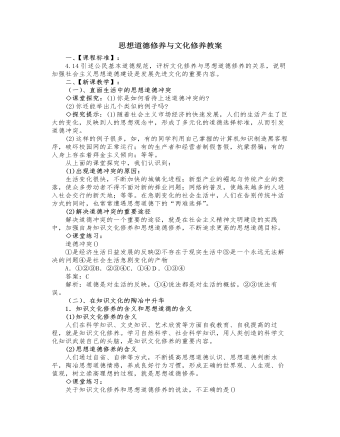
人教版高中政治必修3思想道德修养与文化修养教案
(2)这样的例子很多,如,有的同学利用自己掌握的计算机知识制造黑客程序,破坏校园网的正常运行;有的生产者和经营者制假售假,坑蒙拐骗;有的人身上存在着拜金主义倾向;等等。从上面的课堂探究中,我们认识到:(1)出现道德冲突的原因:生活变化很快,不断加快的城镇化进程;新型产业的崛起与传统产业的衰落,使众多劳动者不得不面对新的择业问题;网络的普及,使越来越多的人进入社会交行的新天地;等等。在急剧变化的社会生活中,人们在告别传统牛活方式的同时,也常常遭遇思想道德下的“两难选择”。(2)解决道德冲突的重要途径解决道德冲突的一个重要的途径,就是在社会主义精神文明建设的实践中,加强自身知识文化修养和思想道德修养,不断追求更高的思想道德目标。◇课堂练习:道德冲突()①是经济生活日益发展的反映②不存在于现实生活中③是一个永远无法解决的问题④是社会生活急剧变化的产物
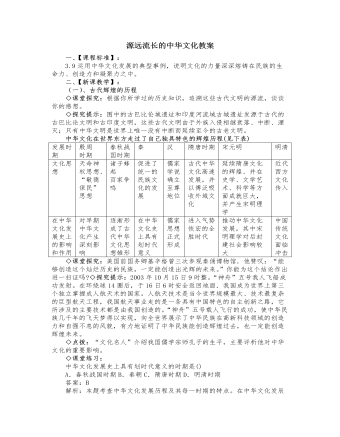
人教版高中政治必修3源远流长的中华文化教案
②在经济上:资本主义经济产生并发展,产生工业革命,开始冲击封建自然经济。③思想上:继文艺复兴后产生启蒙运动,人们的思想观念更加开放,动摇了封建统治的思想,冲击封建统治,人们的民族、民主意识增强。④在文化上:近代自然科学蓬勃发展,奠定近代自然科学的基础。⑤随着新航路的开辟,工业革命开展,西方国家展开殖民掠夺与,各大洲之间相对孤立状态被打破,世界日益成为一个相互影响、联系紧密的整体。(2)①清朝统治者极力提供程朱理学,残酷压抑进步思想.中国思想界“万马齐喑”,死气沉沉。②中国传统科技进入总结时期,现代科技水平落后,日益落在世界潮流后面;③人们封建落后意识浓厚.民族、民主意识薄弱。④以中因为中心的东亚文化圈浙渐稿失。⑤西学大量传入中田,西学东渐现象不断发晨,冲击中国传统思想文化。(3)①国家衰落使文化失去发展的政治、经济条件,加速了文化的衰落。国家衰落是文化衰落的决定性因素。②文化衰落是国家衰落的重要表现,反映了国家衰落.不利于国家发展。
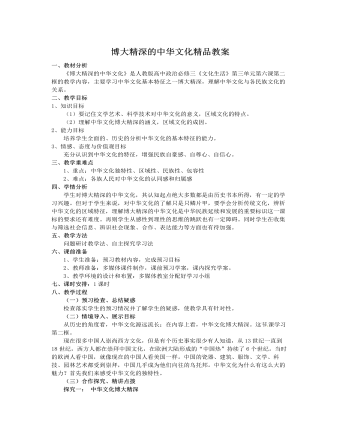
人教版高中政治必修3博大精深的中华文化精品教案
四、学情分析学生对博大精深的中华文化,其认知起点绝大多数都是由历史书本所得,有一定的学习兴趣。但对于学生来说,对中华文化的了解只是只鳞片甲,要学会分析传统文化,辨析中华文化的区域特征,理解博大精深的中华文化是中华民族延续和发展的重要标识这一课标的要求还有难度。再则学生从感性到理性的思维的跳跃也有一定障碍。同时学生在收集与筛选社会信息、辨识社会现象、合作、表达能力等方面也有待加强。五、教学方法问题研讨教学法、自主探究学习法六、课前准备1、学生准备:预习教材内容,完成预习目标2、教师准备:多媒体课件制作,课前预习学案,课内探究学案。3、教学环境的设计和布置:多媒体教室分配好学习小组七、课时安排:1课时八、教学过程(一)预习检查、总结疑惑检查落实学生的预习情况并了解学生的疑惑,使教学具有针对性。(二)情境导入、展示目标从历史的角度看,中华文化源远流长;在内容上看,中华文化博大精深。这节 课学习第二框。
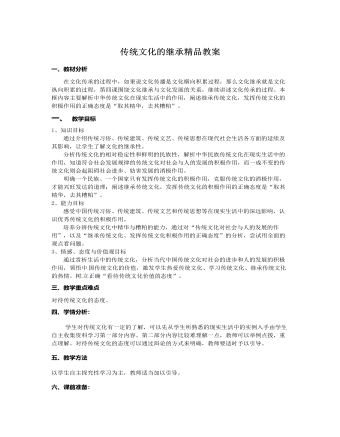
人教版高中政治必修3传统文化的继承精品教案
一、教材分析在文化传承的过程中,如果说文化传播是文化横向积累过程,那么文化继承就是文化纵向积累的过程,第四课围绕文化继承与文化发展的关系,继续讲述文化传承的过程。本框内容主要解析中华传统文化在现实生活中的作用,阐述继承传统文化,发挥传统文化的积极作用的正确态度是“取其精华,去其糟粕”。一、 教学目标1、知识目标通过介绍传统习俗、传统建筑、传统文艺、传统思想在现代社会生活各方面的延续及其影响,让学生了解文化的继承性。分析传统文化的相对稳定性和鲜明的民族性,解析中华民族传统文化在现实生活中的作用,知道符合社会发展规律的传统文化对社会与人的发展的积极作用,而一成不变的传统文化则会起阻碍社会进步、妨害发展的消极作用。明确一个民族、一个国家只有发挥传统文化的积极作用,克服传统文化的消极作用,才能兴旺发达的道理;阐述继承传统文化,发挥传统文化的积极作用的正确态度是“取其精华,去其糟粕”。
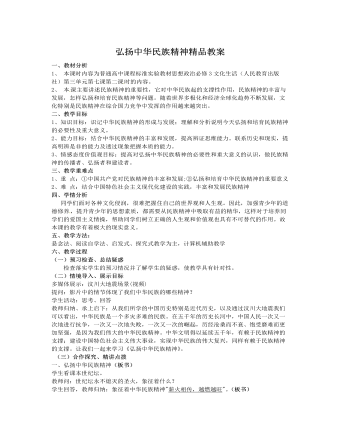
人教版高中政治必修3弘扬中华民族精神精品教案
9.我们的祖国历史悠久,文化灿烂。我国是世界著名的四大文明古国之一,有近5000年的文字记载的悠久历史,我国各民族人民创造了灿烂的古代文化和科学技术。张衡发明的“浑天仪”、“地动仪”比欧洲早1700多年;祖冲之的“圆周率”推算,比西方世界早了1000多年;华佗的全身麻醉技术也比西方早10000多年;炼铁技术的发明比欧洲早1900多年……中国的“四大发明”更是推动了人类历史文明的进程。5000多年的历史造就了中华民族灿烂的文化,涌现出大批伟大的思想家、文学家、艺术家,也出现了一大批优秀的艺术作品,这都是先人留给我们的宝贵精神财富。以上材料说明 ( )①中华文化历史悠久,源远流长是中华文化的基本特征 ②中华文化博大精深,具有非常丰富的内容 ③中华民族对人类世界的发展做出了巨大的贡献 ④中华文化曾长期居于世界文化发展的 前列,是世界上最优秀的民族文化之一A. ①② B. ①②③ C. ①②③④ D. ①②④
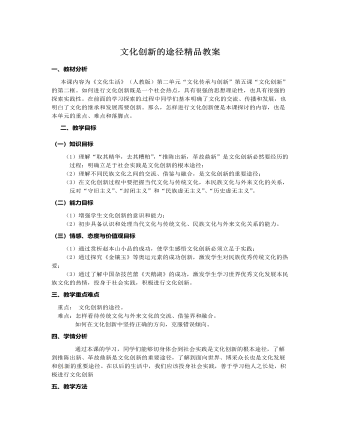
人教版高中政治必修3文化创新的途径精品教案
一、教材分析本课内容为《文化生活》(人教版)第二单元“文化传承与创新”第五课“文化创新”的第二框。如何进行文化创新既是一个社会热点,具有很强的思想理论性,也具有很强的探索实践性。在前面的学习探索的 过程中同学们基本明确了文化的交流、传播和发展,也明白了文化的继承和发展需要创新。那么,怎样进行文化创新便是本课探讨的内容,也是本单元的重点、难点和落脚点。二、教学目标(一)知识目标 (1)理解“取其精华,去其糟粕”,“推陈出新,革故鼎新”是文化创新必然要经历的过程;明确立足于社会实践是文化创新的根本途径;(2)理解不同民族文化之间的交流、借鉴与融合,是文化创新的重要途径;(3)在文化创新过程中要把握当代文化与传统文化,本民族文化与外来文化的关系,反对“守旧主义”、“封闭主义”和“民族虚无主义”、“历史虚无主义”。
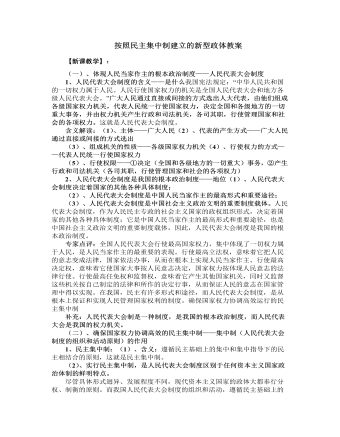
人教版高中政治选修3按照民主集中制建立的新型政体教案
◇本框题小结:◇3个体现:即人民代表大会制度是我国的根本政治制度的3个体现(1)、人民代表大会制度决定着国家的其他各种具体制度;(2)、人民代表大会制度是中国人民当家作主的最高形式和重要途径;(3)、人民代表大会制度是中国社会主义政治文明的重要制度载体。◇3个表现:即民主集中制确保国家权力协调高效的表现:(1)、从人民代表大会和人民的关系来看①各级人民代表受选民和原选举单位的监督,选民或选举单位有权罢免自己选举出的代表;②各级人民代表大会代表人民统一行使国家权力(2)、从人民代表大会与其他国家机关的关系来看①其他国家机关都由人民代表大会产生,对它负责、受它监督;②在人民代表大会统一行使国家权力的前提下,其他国家机关依照法定分工依法行使各自的职权。(3)、从中央和地方的关系来看①地方必须服从中央;②在保证中央统一领导的同时,必须考虑地方特殊利益,充分发挥地方的主动性和积极性。
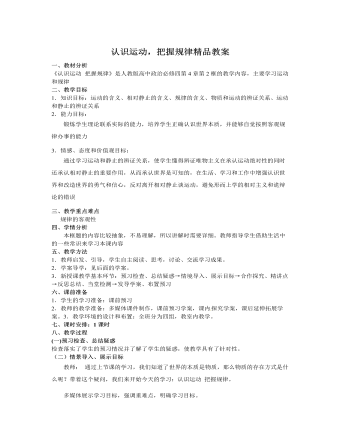
人教版高中政治必修4认识运动,把握规律精品教案
一、教材分析 《认识运动 把握规律》是人教版高中政治必修四第4章第2框的教学内容,主要学习运动和规律二、教学目标1.知识目标:运动的含义、相对静止的含义、规律的含义、物质和运动的辨证关系、运动和静止的辨证关系2.能力目标: 锻炼学生理论联系实际的能力,培养学生正确认识世界本质,并能够自觉按照客观规律办事的能力3.情感、态度和价值观目标:通过学习运动和静止的辨证关系,使学生懂得辨证唯物主义在承认运动绝对性的同时还承认相对静止的重要作用,从而承认世界是可知的,在生活、学习和工作中增强认识世界和改造世界的勇气和信心,反对离开相对静止谈运动,避免形而上学的相对主义和诡辩论的错误三、教学重点难点规律的客观性四、学情分析本框题的内容比较抽象,不易理解,所以讲解时需要详细。教师指导学生借助生活中的一些常识来学习本课内容
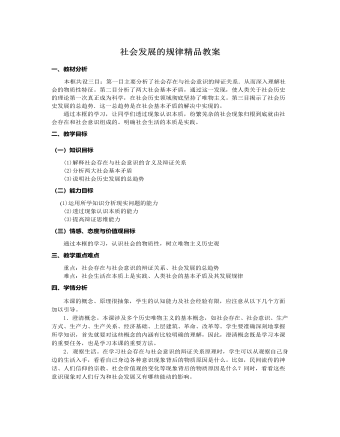
人教版高中政治必修4社会发展的规律精品教案
四、学情分析本课的概念、原理很抽象,学生的认知能力及社会经验有限,应注意从以下几个方面加以引导。1.澄清概念。本课涉及多个历史唯物主义的基本概念,如社会存在、社会意识、生产方式、生产力、生产关系、经济基础、上层建筑、革命、改革等。学生要准确深刻地掌握所学知识,首先就要对这些概念的内涵有比较明确的理解,因此,澄清概念既是学习本课的重要任务,也是学习本课的重要方法。2.观察生活。在学习社会存在与社会意识的辩证关系原理时,学生可以从观察自己身边的生活入手,看看自己身边各种意识现象背后的物质原因是什么。比如,民间流传的神话、人们信仰的宗教、社会价值观的变化等现象背后的物质原因是什么?同时,看看这些意识现象对人们行为和社会发展又有哪些能动的影响。

人教版高中政治必修4唯物主义和唯心主义精品教案
一、教材分析《唯物主义和唯心主义》是人教版高中思想政治必修模块4《生活与哲学》第一单元第二课第二框题内容。这一框主要是通过对哲学存在和发展的具体形态的介绍,让学生从中感受什么是哲学。围绕着这个问题,教材设计了两目:第一目主要是通过对历史上各种不同的唯物主义哲学的介绍,从中概括出唯物主义的三种基本形态;第二目主要是通过对历史上各种不同的唯心主义哲学的介绍,从中概括出唯心主义的两种基本形态。二、教学目标(一)知识目标什么是唯物主义,什么是唯心主义 ;理解哲学基本问题第一方面的内容是划分唯物主义和唯心主义的唯一标准;如何区分唯物主义的三种基本形态和唯心主义的两种基本形态。(二)能力目标初步具有自觉运用唯物主义理论知识,分析和把握社会生活现象的 能力。(三)情感、态度与价值观目标在实践中坚持辨证唯物主义观点,自觉反对和批判唯心主义。三、教学重点难点1、唯物主义和唯心主义的根本观点(重点)
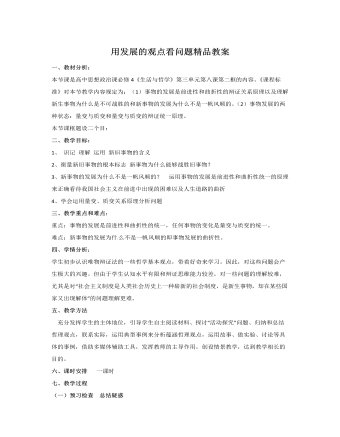
人教版高中政治必修4用发展的观点看问题精品教案
一、教材分析:本节课是高中思想政治课必修4《生活与哲学》第三单元第八课第二框的内容。《课程标准》对本节教学内容规定为:(1)事物的发展是前进性和曲折性的辩证关系原理以及理解新生事物为什么是不可战胜的和新事物的发展为什么不是一帆风顺的。(2)事物发展的两种状态:量变与质变和量变与质变的辩证统一原理。本节课框题设二个目:二、教学目标:1、 识记 理解 运用 新旧事物的含义2、衡量新旧事物的根本标志 新事物为什么能够战胜旧事物?3、新事物的发展为什么不是一帆风顺的? 运用事物的发展是前进性和曲折性统一的原理来正确看待我国社会主义在前进中出现的困难以及人生道路的曲折4、学会运用量变、质变关系原理分析问题三、教学重点和难点:重点:事物的发展是前进性和曲折性的统一,任何事物的变化是量变与质变的统一。难点:新事物的发展为什 么不是一帆风顺的即事物发展的曲折性。
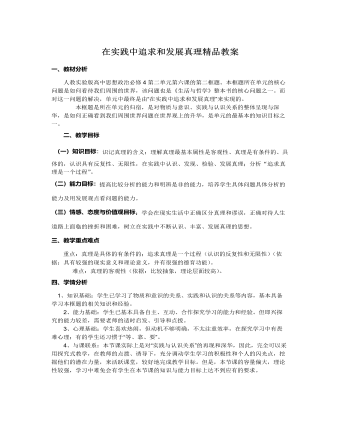
人教版高中政治必修4在实践中追求和发展真理精品教案
一、教材分析人教实验版高中思想政治必修4第二单元第六课的第二框题。本框题所在单元的核心问题是如何看待我们周围的世界,该问题也是《生活与哲学》整本书的核心问题之一。而对这一问题的解决,单元中最终是由“在实践中追求和发展真理”来实现的。 本框题是所在单元的归宿,是对物质与意识、实践与认识关系的整体呈现与深华,是如何正确看到我们周围世界问题在世界观上的升华,是单元的最基本的知识目标之一。 二、教学目标(一)知识目标:识记真理的含义;理解真理最基本属性是客观性、真理是有条件的、具体的,认识具有反复性、无限性,在实践中认识、发现、检验、发展真理;分析“追求 真理是一个过程”。(二)能力目标:提高比较分析的能力和明辨是非的能力,培养学生具体问题具体分析的能力及用发展观点看问题的能力。(三)情感、态度与价值观目标:学会在现实生活中正确区分真理和谬误,正确对待人生道路上面临的挫折和困难,树立在实践中不断认识、丰富、发展真理的思想。

新人教版高中英语必修3Unit 1 Festivals and Celebrations-Listening &Speaking&Talking教学设计
The theme of this section is “Talk about festival activities and festival experiences”.Festival and holiday is a relaxing and interesting topic for students. This part talks about the topic from the daily life of students’. In the part A ---Listening and Speaking, there are three conversations among different speakers from three countries(Japan, Rio and China), where the speakers are participating in or going to participate in the festivals and celebrations. So listening for the relationship among them is a fundamental task. Actually, with the globalization and more international communication, it is normal for Chinese or foreigners to witness different festivals and celebrations in or out of China. In the Conversation 1, a foreign reporter is interviewing a Japanese young girl who just had participated in the ceremony of the Coming-of-Age Day on the street and asking her feeling about the ceremony and the afterwards activities. Conversation 2, Chinese girl Li Mei is witnessing the Rio Carnival for the first time, and her friend Carla gives her some advice on the costumes which enables her to match with the carnival to have a good time. Conversation 3, a Chinese guide is showing a group of foreign visitors around the Lantern Festival and introducing the customs of the festival to them. The three conversations have a strong vitality and insert the festival and cultural elements from different countries. So perceiving the festivals and cultures from different countries is the second task. At the same time, the scripts also insert the targeted grammar --- v-ing as attributive and predicative, which students can perceive and experience in a real context and make a road for the further study. That is the third task. In the Part B--- Listening and Talking, the theme is “Talk about festival experience”, which is the common topic in our daily conversations. During the conversation, Song Lin, a Chinese student, asked Canadian friend Max about how to spend Christmas. In the conversation, Song Lin talked about experience and the feelings during the Chinese Spring Festival, during which there are not only some enjoyable things but some unpleasant things. After the listening, perhaps students find there are some similarities between Christmas and the Chinese Spring Festival as there are some differences in the origins and celebrations. For example, people always visit friends and relatives, decorate their houses, have a big dinner together, chat and give presents to each other.

新人教版高中英语必修3Unit 2 Morals and Virtues-Discovering Useful Structure教学设计
1. 表示时间。Hearing these stories, I’m skeptical about the place. = When I heard these stories. . . 2. 表示原因。Not knowing his address, I can’t send this book to him. = Because/Since/As I don’t know his address. . . 3. 表示结果。His father died, leaving him a lot of money. =. . . and left him a lot of money4. 表示条件。Going straight down the road, you will find the department store. = If you go straight down the road. . . 5. 表示让步。Being tired, they went on working. =Although they were tired. . . 6. 表示行为方式、伴随情况或补充说明。He lay on the grass, staring at the sky for a long time. =. . . and stared at the sky for a long time注意:非谓语动词作状语时, 如所提供的动词不能和句子中的主语保持一致, 动词-ing形式必须有自己的逻辑主语, 通常由名词或代词来担任, 这就是独立主格结构。The last bus having gone, we had to walk home. (having gone的逻辑主语是the last bus, 而不是we)Weather permitting, the football match will be played on Friday. (permitting的逻辑主语是time, 而不是the football match)Step 7 Practice1. ________(study) hard, you are sure to get first prize. 2. People use plastic in their daily life, _______(leave) large amounts of waste. 3. ________(work) hard at your lessons, you are to succeed. 4. The old man, ____________(work) abroad for twenty years, is on the way back to his motherland. 5. ______________(finish) his homework, he was playing on the playground. Answers: 1. Studying 2. leaving 3. Working 4.having worked 5. Having finishedStep 8 HomeworkFinish the homework on Page 22.

新人教版高中英语必修3Unit 2 Morals and Virtues-Reading for Writing教学设计
1. 这个寓言是一个关于一位国王古寓言。 The fable is an old fable about a king.2.作者用这个故事让读者对于社区的问题负有个人责任的必要印象深刻。The author used the story to impress upon readers with the need to take personal responsibility for problems in the community.3. 这个故事十分成功的实现了它的目的。The story was quite successful in achieving its purpose.Step 7 WritingPlease write a review of the story according the outline above.The fable is an old fable about a king who thought his people are lazy, so he put a large stone in the middle of the road and hides and waited to see if anyone will try to move it.The author used this story to impress upon readers with the need to take personal responsibility for problems in the community. The story was quite successful in achieving its purpose, and I liked it because it had a clear moral.However, while the moral of the story is clear, the actions of the king seemed pointless to me, because none of the characters in the story learnt anything. For this reason, I think there are better stories that can be used to impress upon people with the need for personal responsibility.Step 8 Pair workExchange drafts with a partner. Use this checklist to help your partner revise his/her draft.1. Does the writer give a short description of the story ?2. Does the description include the most important details of the story ?3. Does the writer give his or her opinion about the character or their actions ?4. Is the review well-organised ? 5. Does the writer use the -ing form as the adverbial correctly in the writing ?6. Are there any grammar, spelling, or punctuation errors ?Step 9 HomeworkPut up your revised draft in the classroom or read it to your class.

新人教版高中英语必修3Unit 4 Space Exploration-Discovering Useful Structure教学设计
The theme of the section is “Describe space facts and efforts to explore space”. Infinitives are one of non-finite verbs, as the subjects, objects, predicative, attributes and adverbials. This unit is about space exploration, which is a significant scientific activity, so every scientific activity has strong planning. Therefore, using the infinitives to show its purpose, explanations or restrictions is the best choice.1. Learn the structure, functions and features of infinitives.2. Learn to summarize some rules about infinitives to show purpose and modify.3. Learn to use infinitives in oral and writing English. 1. Learn the structure, functions and features of infinitives.2. Learn to summarize some rules about infinitives to show purpose and modify.3. Learn to use use infinitives in oral and writing English.Step 1 Lead in---Pair workLook at the following sentences and focus on the italicized infinitives. In pairs, discuss their functions. 1. I trained for a long time to fly airplanes as a fighter pilot..(作目的状语)2. As we all know, an astronaut needs to be healthy and calm in order to work in space..(作目的状语)3. First of all, you must be intelligent enough to get a related college degree..(作目的状语)4. Some scientist were determined to help humans realise their dream to explore space..(作定语)5. On 12 April 1961, Yuri Gagarin became the first person in the world to go into space..(作定语)Summary:1. 不定式的结构:to+do原形。2. 分析上面的句子,我们知道在描述太空探索时,动词不定式不仅可以用来表目的,还可以用来作定语,表修饰。

新人教版高中英语必修3Unit 5 The Value of Money-Listening &Speaking&Talking教学设计
4. A:We’d like to have someone to say a word at the beginning to welcome the group.B:↙Who?A:We thought that you or Dr.Johnson might do it.B用降调说Who,其意思是问,对方想让谁在开场时致欢迎词。Step 6 Pronunciation---Practice1. Listen to the short conversation and mark the intonation with ↗, ↙ or ↙, ↗. Then discuss with a partner what they intend to convey by using different intonation.Owner: You know what ?↗ It’s a million-pound bank note↙.Waiter 1: Really ?↗(question)Waiter 2: Really !↙(unbelievable and surprised)Waiter 3: Really ?!↙↗(first question then surprised)2. Listen to the conversations. Underline the parts that are stressed and mark the intonation. Then talk about the implied meanings of the responses with different intonations. Listen again and repeat.1) Henry: It’s a nice suit.Owner: Oh, it’s perfect!↙(The intonation means it is very suitable for Henry.)2) Henry: Well, that’s very kind of you.Owner: Kind, sir ?↗(what you said is not right) No, it’s kind of you. You must come whenever you want and have whatever you like. Just having you sit here is a great honour !!↙(welcome you to come again)3)Henry:Well, to be honest, I have none. Oliver:(happily) What luck!(excited) Brother↗, what luck!↙(It means “Didn’t you hear it?”)Henry: Well, it may seem lucky to you but not to me!↗(angry) If this is your idea of some kind of joke, I don’t think it’s very funny. Now if you’ll excuse me, I ought to be on my way.↙(If so, I would leave.)Roderick: Please don’t go↙...(hope Henry can wait for a moment)Part B Viewing and Talking---Describe people’s changing attitudes in a film clipStep 1 Before-listening---Tell the filmYou are going to watch part of the film The Million Pound Bank Note. Look at these photos and guess what happens in the film.

新人教版高中英语必修3Unit 5 The Value of Money-Reading and Thinking教学设计一
Everybody wants to get wealth.In today’s material world,making money or becoming wealthy symbolizes a person’s success and capability. Many people just make every effort, pay any price to attain greater wealth. With money,they can buy nice, large apartments in nice neighborhood. With money they can own luxurious cars. Wealth seems to bring all happiness in life.But is wealth the only road to happiness? Not really. There are many things in the world, which are beyond the means of money, such as friendship, love, health and knowledge. People are so preoccupied with struggling for money that they have no time or would not take the time to form or maintain friendship. What happiness can they feel living as lonely miserable creatures without love or friends in the world even if they accumulate tremendous wealth?In my opinion, people can’t do anything without money, but money is not everything. What money will bring you depends on your personal belief and goal in life. If you are kind enough to help others, especially the poor, money is a good thing to you. With it, you can do much more for the benefit of people and your country, and it will add to your own happiness. If you want money just for your own needs, you’ll never be satisfied or happy. In a word,you should have money spent for more people. Only then can money be the source of your happiness.Step 8 Homework4 students in a group, one acts Roderick, one Oliver, one servant and the fourth one acts Henry Adams, then listen to the tape, pay more attention to the difference between American English and British English in pronunciation, stress, tone.

新人教版高中英语必修3Unit 5 the value of money-Reading For Writing教学设计一
【参考范文】Narrator:(Henry is smiling as he leaves the restaurant. As he is walking down the street, he sees a sign for a place that cuts hair. He decides to get it cut. )H=Henry;B=Barber;R=rude manH:Good afternoon, I'd like to get a cut, if I may. (The barber looks at Henry's hair and continues cutting another man's hair. )Er, I'd really like a haircut. As you can see it's much too long. B:(in a rude manner) Yes, I can see that. Indeed, I can. H:Fine, well I'll have a seat then. (He sits in one of the barber's chairs. The barber turns to look at Henry. )B:It's quite expensive here, you know!Are you sure you can afford it?H:Yes. I think so. (In comes the rude man. )R:Hey you there. I need a haircut quickly. Can you do me straightaway?B:All right, then, get in the chair and I'll see what I can do. R:Thank you. (sits down in one of the barber's chairs)H:Excuse me, but I was here first. Aren't you going to do my hair first?B:This man's in a hurry. H:Well so am I!I insist that you cut my hair first. B:OK, but I'll have to be quick. This gentleman is waiting. H:Thank you. (They both become quiet. After his hair is cut, the barber tells Henry how much he must pay. Henry shows the barber the bank note. )B:Why, Mr . . . (looks shocked)H:Adams. Henry Adams. I'm sorry, I don't have any change. R:You're that Mr Adams! Well,I'm glad I waited or I might never have known it was you. B:Why, Mr Adams, please don't worry!(wearing a big smile) Nothing to worry about!Nothing at all!Please come back any time, even if you only need too little hairs cut!It will be my honour to serve you!

新人教版高中英语选修2Unit 1 Science and Scientists-Discovering useful structures教学设计
The grammatical structure of this unit is predicative clause. Like object clause and subject clause, predicative clause is one of Nominal Clauses. The leading words of predicative clauses are that, what, how, what, where, as if, because, etc.The design of teaching activities aims to guide students to perceive the structural features of predicative clauses and think about their ideographic functions. Beyond that, students should be guided to use this grammar in the context apporpriately and flexibly.1. Enable the Ss to master the usage of the predicative clauses in this unit.2. Enable the Ss to use the predicative patterns flexibly.3. Train the Ss to apply some skills by doing the relevant exercises.1.Guide students to perceive the structural features of predicative clauses and think about their ideographic functions.2.Strengthen students' ability of using predicative clauses in context, but also cultivate their ability of text analysis and logical reasoning competence.Step1: Underline all the examples in the reading passage, where noun clauses are used as the predicative. Then state their meaning and functions.1) One theory was that bad air caused the disease.2) Another theory was that cholera was caused by an infection from germs in food or water.3) The truth was that the water from the Broad Street had been infected by waste.Sum up the rules of grammar:1. 以上黑体部分在句中作表语。2. 句1、2、3中的that在从句中不作成分,只起连接作用。 Step2: Review the basic components of predicative clauses1.Definition

